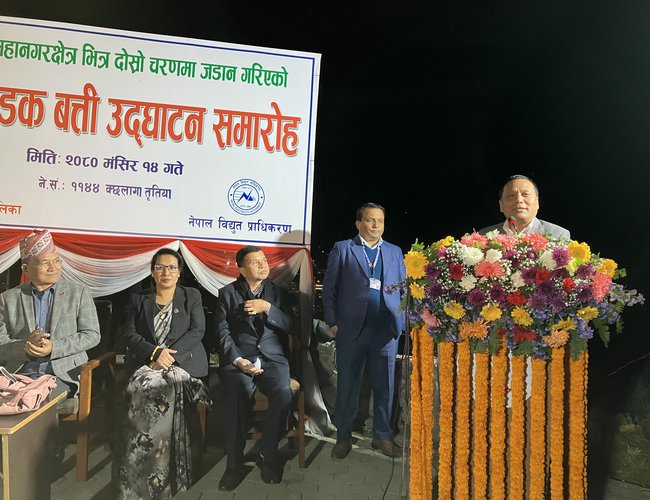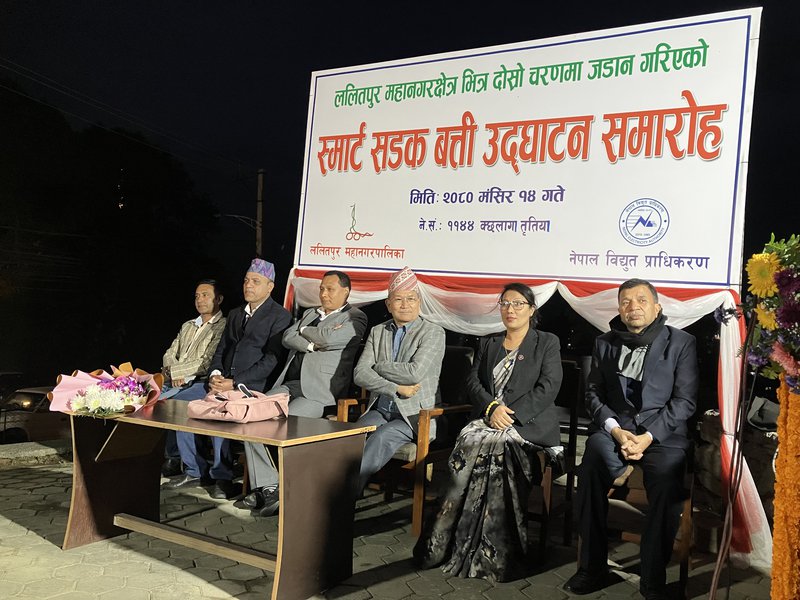
Kulman Ghising, Managing Director of the Nepal Electricity Authority, said that the work to underground the electricity distribution system in Kathmandu Valley has come to a halt due to a lack of permission from the road department to dig the road.
MD Ghising, stated that the lack of coordination between government agencies resulted in the unfortunate abandonment of a significant and crucial project.
Since last June, the work to create an underground electricity distribution system has been at a standstill after the road department refused to allow digging under its jurisdiction.
MD Ghising stated that the skilled professionals who were responsible for burying the wiring have departed the construction area. During a ceremony in Lalitpur on Thursday (November 11) to introduce smart street lights installed in conjunction with the Lalitpur Metropolitan Municipality and NEA, MD Ghising revealed this information.
He mentioned that there is still sufficient time to save the project. "If municipal representatives coordinate with the road department where the project is taking place, it has the potential to be successful," stated MD Ghising. He stressed the importance of everyone working to their fullest potential.
"Although the municipalities have granted permission to work on the road, the road department is not allowing them to proceed," added MD Ghising.
"Implementing the wire underground is 10 times more expensive than overhead. Despite our coordination efforts, we have not yet received permission from the road department."

The lack of coordination has caused trouble for this significant project. It is unfortunate, and I share in the pain caused by this issue. It is noteworthy that the forest prohibits the construction of transmission lines, and the road has its own rules, similar to those of the forest. The primary question is where we will work. We all bear responsibility for the current situation, but we must take responsibility and work towards a solution.
In the initial stage, the Ratnapark and Maharajganj distribution centers in Kathmandu initiated efforts to strengthen and automate the electricity distribution system of Kathmandu Valley by making it underground.
The second phase commenced in Kathmandu district's remaining locations, followed by the third phase focusing on the urban areas of Lalitpur and Bhaktapur. The fourth phase involved underground distribution system strengthening and automation of Pokhara and Bharatpur Metropolitan Municipality areas. The project includes laying of optical fiber, in addition to 33, 11, and 400 voltage underground line constructions, leading to a significant enhancement of the city's aesthetics.
The cities made ugly by the tangled wires of electricity, telephone, and internet service providers and will add beauty.
MD Ghising said that if there is development, common people will have to take it easy and have to face hardships for short period.
"If there is a little trouble, the ward scolds, the municipality scolds, they don't allow the road to work in some places, if they work without consent, they lock up our employees", he said.
Despite making multiple attempts, if we do not receive authorization from the road, the contractors refuse to complete the work while on site. They insist that the work cannot proceed without proper consent. This inhibits progress, leaving no viable solution even if I desire to do so.
The subterranean system will provide enhanced safety compared to the existing above-ground distribution system. The aesthetic appeal of the city can be preserved by eliminating the unsightly wire mesh.
A minimally disruptive technology has been employed to minimize damage to the roadway during subterranean construction. Nighttime work has been scheduled to avoid disruption to vehicular and pedestrian traffic. Appropriate measures have been taken to mitigate the impact of dust released during road excavation on the public. A plan has been put in place to repair the road damaged during the process of installing underground wiring within 10 days.
The road authority has requested half of the bond for repairing the road.
The department has proposed that 50% of the estimated cost of the road section where the wire is being laid underground, should be kept as a bond. However, there is a proposal to increase it to 50%. Previously, the department utilized a 20% bond for the work completed. A bond has been arranged for the repair of the road should the authority leave after finishing their work. Upon road repair, the department will refund the bond amount.
Tara Prasad Pradhan, the Deputy Executive Director of the Authority's Project Management Directorate, reported that the Road Department has proposed maintaining a 50% bond on contracts to be awarded this year.
The Nepali Government has yet to allot funds for the budget while we also do not possess it. In previous years, 20 percent was retained; however, this year it has been suggested to withhold 50 percent of the bond. Deputy Executive Director Pradhan has asserted that the agreement should comply with the former arrangement. "A proposal has been made to require approval from water and sanitation agencies before granting permission to lay wires under the road.
However, there is a significant coordination issue.
Installing underground wiring is ten times more expensive than overhead wiring and it is challenging to locate existing infrastructure when digging the road. Despite coordination efforts, road permits remain elusive." Permission was not granted during the rainy season, but even though it has ended, approval has not been received yet.
The contractors have departed, declaring that they will no longer continue the project. However, if the municipalities' representatives coordinate with the road department, there is still time to rectify the situation. Unfortunately, the project has been neglected due to a lack of coordination. This is regrettable and poses a so-called "pain point." The forest state prohibits the construction of a transmission line.
The road is the state. And wherever we work, we are all responsible for this situation. Let us all work responsibly. If the common people also develop, they will have to face hardships for some time. It should be taken lightly. If it is a little too much, the ward will scold the municipality, the road will not be allowed to work in some places. They arrest our employees to work without consent.
Contractors take the stand that we cannot do work without consent. Even if I want to, I can't make it work.
There is a big problem of coordination. If this is not resolved, development in Nepal is not possible. The same difficulty is being faced in the construction of the transmission line. They raise slogans of death against me.
There is currently an interruption in the calculation as my house's light is on, but nothing is happening on my land. Various international non-governmental organizations are tasked with halting development work.
If the World Bank, Asian Development Bank, and European Investment Bank invest in the project, domestic and international non-governmental organizations may attempt to impede progress.
The labor force in Nepal has experienced an upsurge in non-participation. Negativity pervading discussions creates an unfavorable climate for work.
Challenges are ubiquitous, with the forest presenting an especially daunting obstacle for the community. Not a single tree can be cut. Unable to proceed with the 1061 MW Upper Arun project due to the inability to cut trees.
- The Sentiment Of Monetary Policy Seems Focused On Increasing Eemand: FNCCI President Chandra Prasad Dhakal
- Jul 26, 2024
- Monetary Policy 081/82 Is Making The Economy More Dynamic: Governor Adhikari
- Jul 26, 2024
- Global IME Bank And Shashila Motors Signed Agreement Regarding Electric Vehicle loan
- Jul 26, 2024
- Lok Bahadur Thapa, permanent representative of the UN in New York, was appointed as the Vice President of ECOSOC
- Jul 26, 2024
- Leeladevi Gadtaula Became The First woman Chief Secretary
- Jul 26, 2024
















